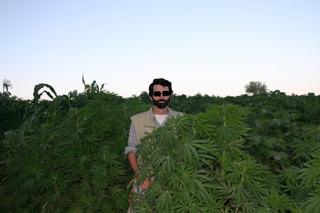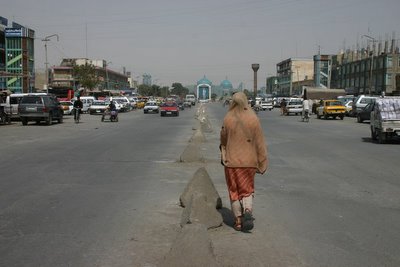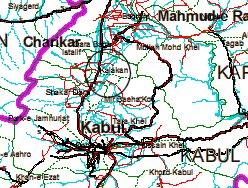I Fell in Love With a Boy in a Marijuana Field in Mazar-e-Sharif
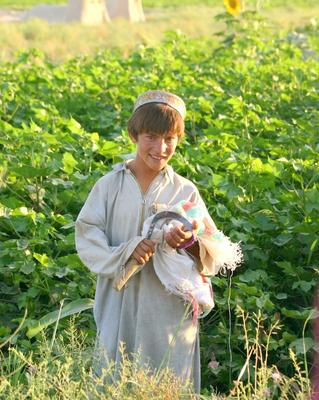
Ben and I bought our tickets for the KamAir flight to Mazar for Thursday, and plan to return on Saturday. We made all the necessary arrangements for getting to the airport, getting picked up at the airport, and getting back. Our travel office makes the arrangements for us and on Thursday morning, we are accompanied by Noori to the airport in Kabul where we get through security (I through the special women's section, a separate room behind a curtain for modest secuirty check) and head out to the hangar to wait for the tiny plane that will fly us north, over the Hindu Kush, to the area where Alexander the Great found his central asian wife so many years ago.
 We sat on small metal chairs with our bags outside of the hangar, looking out over the tarmac, trying not to be too hot. I looked over at the mountains beyond and tried to remember that I had only just flown in for the first time a few short weeks ago. Already its hard to remember the disbelief I felt when I tried to understand that I was here, in Afghanistan.
We sat on small metal chairs with our bags outside of the hangar, looking out over the tarmac, trying not to be too hot. I looked over at the mountains beyond and tried to remember that I had only just flown in for the first time a few short weeks ago. Already its hard to remember the disbelief I felt when I tried to understand that I was here, in Afghanistan.After some time, we were instructed to follow a man across the tarmac to a small plane at the far side of the pavement. Our packs were in the back of the plane, secured by a sort of mesh netting.
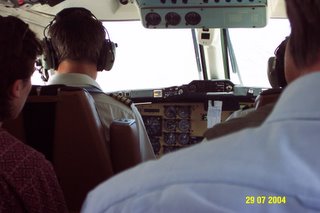 I think there were about 10 passenger seats. There was no separate cockpit, and I sat basically right behind the copilot. It was actually pretty cool to watch them doing all of those pilot-y things, pushing all of those buttons, wearing the headsets, looking through logs and what-not.
I think there were about 10 passenger seats. There was no separate cockpit, and I sat basically right behind the copilot. It was actually pretty cool to watch them doing all of those pilot-y things, pushing all of those buttons, wearing the headsets, looking through logs and what-not.The view as we flew over the Hindu Kush was also pretty amazing. I wish this photo came anywhere close to doing it justice.
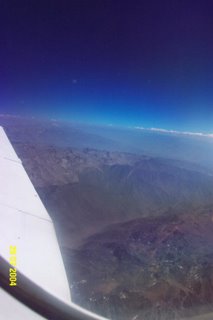
When we arrived, I really had to pee. It was extremely hot. And humid. And I was desperate to find a bathroom. That stinky pit toilet in the hall of the airport (a small concrete building that might have been abandoned) was such a relief!
Muhammad Shah's driver came and met us at the airport and drove us back to the ZOA office in downtown Mazar-e-Sharif. Mazar is much, much flatter than Kabul. It is actually quite striking. Driving to the city, you can look out and see flat land for miles and miles.
We arrived at the ZOA office and were welcomed to the downstairs room where lunch was served. Usual yummy Afghan fare, including the yummiest watermelon yet! Everyone had told us that Mazar was the place for tarboza. They were totally right.
Since the gang had to work, Ben and I decided that we would take a walk into town and do a bit of exploring. Our hosts discouraged us, concerned we would get lost and it was too hot, but we were not about to sit around inside when there were discoveries to be made and experiences to be had, so we decided to try our luck regardless. We asked the guard at the gate the general direction to walk to get to town, and he instructed us with some disbelief that we actually intended to walk in this heat when we could stay inside and relax in the "cool" of the fan.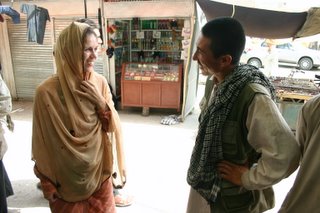 Ben and I found our way through the main bazaar and to the famed Blue Mosque. I had been told that around here, I should take care to always have my head covered. Indeed, all the women here, where they were to be seen, were dressed in full burqa, although here instead of the sky blue I was used to seeing in Kabul and its nearby villages, the women wore white. Were it not for the terrible oppression underlying its origins and the reason for wearing it, one might be tempted to agree with the men here who admire the beauty of such dress. People were very friendly to us, eager to communicate and say "hello!" I got to use my Uzbek of old, and was so pleased to witness the shock on people's faces when I greeted them with "Salam alaykum, yakhshimisiz?" and respond to them with "Yakhshi, rahmat" While Ben was buying a vest (so as to better fit the style of Afghan men), I got into a pleasant conversation with an Uzbek man. (see photo above) I understood him way more than I was able to communicate, per usual.
Ben and I found our way through the main bazaar and to the famed Blue Mosque. I had been told that around here, I should take care to always have my head covered. Indeed, all the women here, where they were to be seen, were dressed in full burqa, although here instead of the sky blue I was used to seeing in Kabul and its nearby villages, the women wore white. Were it not for the terrible oppression underlying its origins and the reason for wearing it, one might be tempted to agree with the men here who admire the beauty of such dress. People were very friendly to us, eager to communicate and say "hello!" I got to use my Uzbek of old, and was so pleased to witness the shock on people's faces when I greeted them with "Salam alaykum, yakhshimisiz?" and respond to them with "Yakhshi, rahmat" While Ben was buying a vest (so as to better fit the style of Afghan men), I got into a pleasant conversation with an Uzbek man. (see photo above) I understood him way more than I was able to communicate, per usual.
From the bazaar, we walked down the middle of the street toward the blue mosque, which has a large portrait of Massoud hanging in front of it. It really dominates--defines, even---the city. 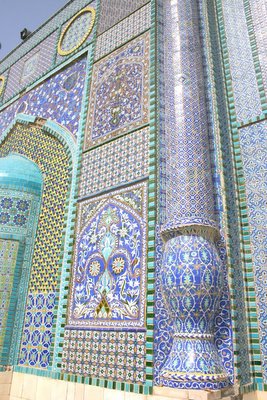
It's pretty amazing. As we neared the mosque, we encountered a group of Iranian soldiers, who were impressed with our Persian and excited to invite us to dine with them at their quarters and to vitit their country. We thanked them and continued on toward the grounds of the mosque. Closer up, the mosque is even more beautiful. (So much greater the disappointment when my camera stopped working! Hence, most of these photos are Ben's) Decorated with thousands of tiles in intricate and beautiful patterns, it is a testament to more prosperous and peaceful times. To underscore this and to remind us of a hope for peaceful times yet to come, thousands of white doves (pigeons?) make their home on the mosque grounds. One man told us confidently that all birds who come here turn white after a few weeks. 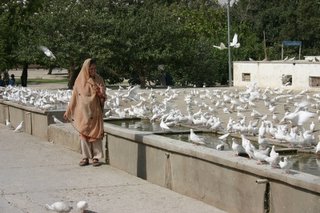 We need only look to confirm that only white birds lived there. How else do you explain that?
We need only look to confirm that only white birds lived there. How else do you explain that?
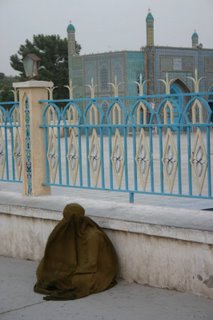 Beggars were everywhere, as is common near places of worship, only here they are beneath tattered burqas or seated on what remains of their legs, arms missing as well. One woman wore a brown burqa, and my heart wrenched to realize that what I had initially glimpsed as a large sack was actually a person. One man swayed from side to side, seated on the ground, singing loudly and fervently, eyes closed, and beating the knubs of his forearms on his knees.
Beggars were everywhere, as is common near places of worship, only here they are beneath tattered burqas or seated on what remains of their legs, arms missing as well. One woman wore a brown burqa, and my heart wrenched to realize that what I had initially glimpsed as a large sack was actually a person. One man swayed from side to side, seated on the ground, singing loudly and fervently, eyes closed, and beating the knubs of his forearms on his knees.
 And of course, groups of laughing children in raggedy shalwar kameez gathered to have their photo taken.
And of course, groups of laughing children in raggedy shalwar kameez gathered to have their photo taken.
We left the mosque and tracked back through the bazaar to return to ZOA in time to go out with the guys. We ended up going to some expat party where there was a lot of beer and a lot of very serious discussion about their group and whether or not to let military folks attend their functions. It was really interesting to listen to the concerns that this social group has about its identity. For people living here as expatriates, this is the only social network that they really have, and it becomes extremely important to identity. Anyway, it was actually pretty serious business, and I got some insight into the life of the isolation of aid work in small villages in distant, insecure countries.
After the party, it was late and I was really hungry, and a couple of the guys  there invited us back to their compound for pizza and more beer. We ended up staying there, and sleeping under mosquito nets outside. During the summer, they take their little mattresses and set them up under trees and drape the mosquito nets over them; the resulting effect is a lush garden with little pods here and there from which men emerge ever morning. At first we just kind of fell asleep on this deck next to the "pool" (a reservoir), under the stars. But I was pretty uncomfortable, so I took over one of the pods. Next morning up for Nescafe (I can't wait to have real coffee again) before meeting up with Muhammad Shah to meet his wife and take a day trip to Balkh, the actual village where Alexander met and married his wife.
there invited us back to their compound for pizza and more beer. We ended up staying there, and sleeping under mosquito nets outside. During the summer, they take their little mattresses and set them up under trees and drape the mosquito nets over them; the resulting effect is a lush garden with little pods here and there from which men emerge ever morning. At first we just kind of fell asleep on this deck next to the "pool" (a reservoir), under the stars. But I was pretty uncomfortable, so I took over one of the pods. Next morning up for Nescafe (I can't wait to have real coffee again) before meeting up with Muhammad Shah to meet his wife and take a day trip to Balkh, the actual village where Alexander met and married his wife.
Here is a bit of info summarized from : http://www.archaeological.org/pdfs/papers/AIA_Afghanistan_address_lowres.pdf
Balkh was sometimes called “the mother of the world cities” during the Middle Ages. Alexander the Great kept Bactres (Balkh) as the capital of Bactria (around 330 BCE) but transformed it into a Greek city. Most western archaeologists coming to Afghanistan began excavating on the site of today’s Balkh precisely because by 250 BCE it was the capital of the Greek-Bactrian kingdom. The tumultuous history of Balkh is associated with both glorious and tragic events of Central Asia. We know that Genghis Khan had this "mother of the cities" destroyed from top to bottom in 1221. But when Marco Polo visited Balkh a half a century later he mentioned the existence of "many beautiful palaces and marble houses."
We drove west, through fields of lush vegetation, beyond the thousands of years-old remains of the wall that once enclosed and protected the village of Balkh from intruders. The outer wall is high, and stretches for more than 7 miles around the ancient outer limits of the city.
We went up to what I think is probably the site of Tepe, or Tapa, so called of Zargaran, literally 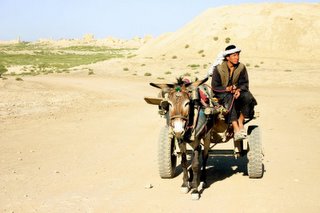 meaning "the jeweler’s hill", which is at the level of the lower city and which has been subject to tons and tons and tons of illegal excavation. We were offered several different items by wandering peddlers (on bikes, donkey carts, motorcycles) claiming to have dug them up themselves: small carvings, coins, jewelry. I guess maybe I should have considered buying something, which is probably ancient and worth a lot more than the pittance they asked. Or would I have been encouraging the destruction of an ancient heritage...? Either way, I didn't buy anything.
meaning "the jeweler’s hill", which is at the level of the lower city and which has been subject to tons and tons and tons of illegal excavation. We were offered several different items by wandering peddlers (on bikes, donkey carts, motorcycles) claiming to have dug them up themselves: small carvings, coins, jewelry. I guess maybe I should have considered buying something, which is probably ancient and worth a lot more than the pittance they asked. Or would I have been encouraging the destruction of an ancient heritage...? Either way, I didn't buy anything.
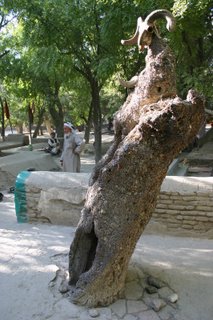 From there, we went to an old cemetery with the gravesite of a local legend who was a great healer. There is a tree trunk in front of his grave with hundreds of nails that have been placed there by faithful pilgrims who believe that by nailing the nails with a fervent prayer and faith, they will be granted their need.
From there, we went to an old cemetery with the gravesite of a local legend who was a great healer. There is a tree trunk in front of his grave with hundreds of nails that have been placed there by faithful pilgrims who believe that by nailing the nails with a fervent prayer and faith, they will be granted their need.
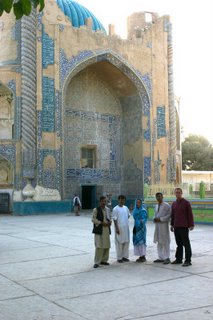 Then we went to the ancient remains of Khwadja Parsa is a mausoleum from the Ghorid period, which dates to the late Timurid provincial style of the 15th century A.D. Here is the tomb of Rabiah Balkhi, the first woman poet of Afghanistan, after whom the women's hospital in Kabul is named.
Then we went to the ancient remains of Khwadja Parsa is a mausoleum from the Ghorid period, which dates to the late Timurid provincial style of the 15th century A.D. Here is the tomb of Rabiah Balkhi, the first woman poet of Afghanistan, after whom the women's hospital in Kabul is named.
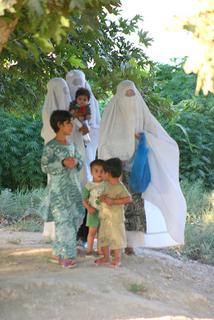 On the way back toward Mazar, and a bit out of the way (off a side road in the middle of fields of marijuana), we found our way to a UNESCO heritage site that serves as a picnic spot for Afghan families, and a pilgrimage spot as well. Families of women in white burqa carrying children rested among the trees and the fields.
On the way back toward Mazar, and a bit out of the way (off a side road in the middle of fields of marijuana), we found our way to a UNESCO heritage site that serves as a picnic spot for Afghan families, and a pilgrimage spot as well. Families of women in white burqa carrying children rested among the trees and the fields.
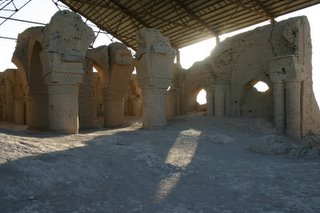 We were told that the crumbling remains of this beautiful mosque were originally erected on the site where a very devout muslim died en route, on foot, to mecca. The 9-domed mosque is named Masjid-e-Tarikh, and was built between the 8th and 9th centuries, the first of its kind in Islam. Wandering among the ancient pillars, I first noticed my love -- a little boy, shepherding a single cow, who was totally intrigued by me but too shy to maintain eye contact. Each time I looked over at him and smiled he smiled despite himself, blushed, and looked away. I fell in love with him immediately. It took more than a half hour of distant flirtation before he was willing to be approached by me. I made him laugh by feeding the donkey the melon rinds and petting him. Finally, as we were about to depart and he was following his cow in another direction, I leapt out of the car and asked to take a photo with him. He was so pleased and so embarrassed at the same time, I wanted nothing more than to please him and bring him happiness. It was a very strange, instantaneous, deep desire to shelter and protect this child that
We were told that the crumbling remains of this beautiful mosque were originally erected on the site where a very devout muslim died en route, on foot, to mecca. The 9-domed mosque is named Masjid-e-Tarikh, and was built between the 8th and 9th centuries, the first of its kind in Islam. Wandering among the ancient pillars, I first noticed my love -- a little boy, shepherding a single cow, who was totally intrigued by me but too shy to maintain eye contact. Each time I looked over at him and smiled he smiled despite himself, blushed, and looked away. I fell in love with him immediately. It took more than a half hour of distant flirtation before he was willing to be approached by me. I made him laugh by feeding the donkey the melon rinds and petting him. Finally, as we were about to depart and he was following his cow in another direction, I leapt out of the car and asked to take a photo with him. He was so pleased and so embarrassed at the same time, I wanted nothing more than to please him and bring him happiness. It was a very strange, instantaneous, deep desire to shelter and protect this child that 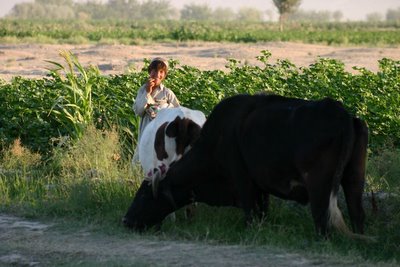 drove me crazy over the next several hours, and occupied my thoughts for months after. Could I adopt this boy? No, of course not. How could I take him away from his family? That would be wrong. But could I pay for his education? How much money does he bring to his family by shepherding this cow, and how much would be necessary to convince his family to let him study instead? Would that make any difference? I could pay for his education and return to visit as often as I could and when he was old enough, I could bring him to the U.S. It sounds stupid, I know, but I was quite consumed with an inexplicable but very real and deep spiritual connection to this boy. I still think of him and wonder if it is too late to do anything to improve his life. I also wonder if I am arrogant to think that his life may need improving and that anything I might do could be an improvement.
drove me crazy over the next several hours, and occupied my thoughts for months after. Could I adopt this boy? No, of course not. How could I take him away from his family? That would be wrong. But could I pay for his education? How much money does he bring to his family by shepherding this cow, and how much would be necessary to convince his family to let him study instead? Would that make any difference? I could pay for his education and return to visit as often as I could and when he was old enough, I could bring him to the U.S. It sounds stupid, I know, but I was quite consumed with an inexplicable but very real and deep spiritual connection to this boy. I still think of him and wonder if it is too late to do anything to improve his life. I also wonder if I am arrogant to think that his life may need improving and that anything I might do could be an improvement.
That night we stayed with the boys, and were treated to amazing home-cooked Indian food. We slept soundly and were disappointed to leave our new friends so soon the next day. Why didn't I get their email addresses? Ben, if you know how to reach them, please pass on word.